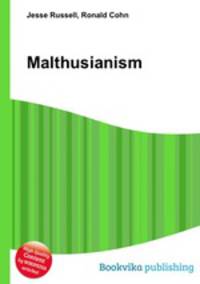Поиск книг, учебников, пособий в онлайн-магазинах

Malthusianism
Автор: Jesse Russell,Ronald Cohn, 111 стр., издатель: "Книга по Требованию", ISBN: 978-5-5086-2895-6High Quality Content by WIKIPEDIA articles! Malthusianism refers primarily to ideas derived from the political/economic thought of Reverend Thomas Robert Malthus, as laid out initially in his 1798 writings, An Essay on the Principle of Population, which describes how unchecked population growth is exponential (1>2>4>8) while the growth of the food supply was expected to be arithmetical (1>2>3>4). Malthus believed there were two types of "checks" that could then reduce the population, returning it to a more sustainable level. He believed there were "preventive" checks such as moral restraints (abstinence, delayed marriage until finances become balanced), and restricting marriage against persons suffering poverty and/or defects. Malthus believed in "positive checks", which lead to 'premature' death: disease, starvation, war, resulting in what is called a Malthusian catastrophe. The catastrophe would return population to a lower, more "sustainable", level. The term has been applied in...
Рейтинг книги: 



 5 из 5, 8 голос(-ов).
5 из 5, 8 голос(-ов).




 5 из 5, 8 голос(-ов).
5 из 5, 8 голос(-ов).




